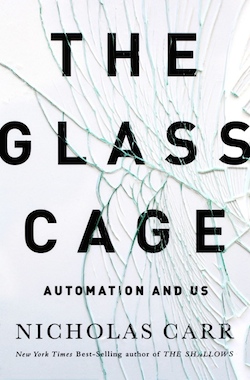
Nicholas Carr has a new book out, called The Glass Cage: Automation and Us, and he opens it by describing his yearning as a young driver for a car with an automatic transmission. It was a new thing at the time, something which allowed drivers the novel experience of multitasking. Those who had automatics had an extra hand for a coke or an eight-track, and an extra foot for thumping the bass line of their favorite Led Zeppelin cut.
has a new book out, called The Glass Cage: Automation and Us, and he opens it by describing his yearning as a young driver for a car with an automatic transmission. It was a new thing at the time, something which allowed drivers the novel experience of multitasking. Those who had automatics had an extra hand for a coke or an eight-track, and an extra foot for thumping the bass line of their favorite Led Zeppelin cut.
The point that this illustration seems downright prehistoric is intended. It was only 40 years ago. 40 years ago we imagined the future with The Jetsons, with flying cars and space station homes. What we’ve gotten is far more impressive, and far more sinister: cars that drive themselves. Automation, Carr argues, is the thing we’ve been working towards since the industrial age, and its effects on us have always left more to be desired.
Psychologists like Mihaly Csikszentmihalyi have called this the “paradox of work,” that we work to have leisure, and yet our leisure leaves us relatively unsatisfied. Carr discusses the findings of his study, and through it touches on the psychological phenomenon of “miswanting.”
The results were surprising. People were happier, felt more fulfilled by what they were doing, while they were at work than during their leisure hours. In their free time, they tended to feel bored and anxious. And yet they didn’t like to be at work. When they were on the job, they expressed a strong desire to be off the job, and when they were off the job, the last thing they wanted was to go back to work. “We have,” reported Csikszentmihalyi and LeFevre, “the paradoxical situation of people having many more positive feelings at work than in leisure, yet saying that they ‘wish to be doing something else’ when they are at work, not when they are in leisure.” We’re terrible, the experiment revealed, at anticipating which activities will satisfy us and which will leave us discontented. Even when we’re in the midst of doing something, we don’t seem able to judge its psychic consequences accurately.
Those are symptoms of a more general afflction, on which psychologists have bestowed the poetic name miswanting. We’re inclined to desire things we don’t like and to like things we don’t desire. “When the things we want to happen do not improve our happiness, and when the things we want not to happen do,” cognitive psychologists Daniel Gilbert and Timothy Wilson have observed, “it seems fair to say we have wanted badly.” And as slews of gloomy studies show, we’re forever wanting badly. There’s also a social angle to our tendency to misjudge work and leisure. As Csikszentmihalyi and LeFevre discovered in their experiments, and as most of us know from our own experience, people allow themselves to be guided by social conventions–in this case, the deep-seated idea that being ‘at leisure’ is more desirable, and carries more status, than being ‘at work’–rather than by their true feelings. “Needless to say,” the researchers concluded, “such a blindness to the real state of affairs is likely to have unfortunate consequences for both individual well-being and health of society.” As people act on their skewed perceptions, they will “try to do more of those activities that provide the least positive experiences and avoid the activities that are the source of their most positive and intense feelings.” That’s hardly a recipe for the good life.
 It’s easy to see this in connection to Carr’s main topic–automation. When speaking of human beings, what happens when things get automated to fulfill the wrong wants? Of course, Carr is not implying that the health of an individual (or a society) comes back to getting off the couch and back to work. Lord knows we “work” too much as it is. What Carr is implying instead, it seems, is that 1) we do not want what’s best for us (a la Romans 7), and 2) when left alone, we tend to be programmed inward. Only when our focus becomes absorbed in something beyond us are we ‘truly happy.’ Gloomily enough, though, our typical picture of ‘leisure’ is exactly the opposite.
It’s easy to see this in connection to Carr’s main topic–automation. When speaking of human beings, what happens when things get automated to fulfill the wrong wants? Of course, Carr is not implying that the health of an individual (or a society) comes back to getting off the couch and back to work. Lord knows we “work” too much as it is. What Carr is implying instead, it seems, is that 1) we do not want what’s best for us (a la Romans 7), and 2) when left alone, we tend to be programmed inward. Only when our focus becomes absorbed in something beyond us are we ‘truly happy.’ Gloomily enough, though, our typical picture of ‘leisure’ is exactly the opposite.
More often than not, our discipline flags and our mind wanders when we’re not on the job. We may yearn for the workday to be over we can start spending our pay and having some fun, but most of us fritter away our leisure hours. We shun hard work and only rarely engage in challenging hobbies. Instead, we watch TV or go to the mall or log on to Facebook. We get lazy. And then we get bored and fretful. Disengaged from any outward focus, our attention turns inward, and we end up locked in what Emerson called the jail of self-consciousness. Jobs even crummy ones, are “actually easier to enjoy than free time,” says Csikszentmihalyi, because they have the “built-in” goals and challenges that “encourage on to become involved in one’s work, to concentrate and lose oneself in it.” But that’s not what our deceiving minds want us to believe. Given the opportunity, we’ll eagerly relieve ourselves of the rigors of labor. We’ll sentence ourselves to idleness…Is it any wonder we’re enamored of automation?

COMMENTS
5 responses to “Automatic Transmissions and the Phenomenon of “Miswanting””
Leave a Reply














So stellar. It isn’t the tech that traps us- it’s the incurved self that creates the tech to lock the feedback loop more firmly in place.
Good, but something needs to be said about exploitative labor. Part of the way exploitative labor has established itself in America is to leverage the kind of denied pleasures and motivations discussed here against employes. The employe is a “team member” or even a “family member” who works for the good of the whole: pay, benefits, and time off are secondary. The latest push to extract more profit form labor is couched as a family emergency where everyone needs to “give a little;” to suggest that some people are doing a lot more taking than giving would poison the “family” environment (and also get one fired and removed from the situation).
This was so well written and helpful. Excellent stuff.
I find that ‘anxiety of leisure’ in myself, but I discovered my anxiety comes from feeling guilty for not being more productive. In contrast, during the year in which I worked every week 8 hours each of 5 days as well as 12 hours each weekend day, I felt tired and bedraggled, but at ease and relieved from guilt. After all, if Sixty-four-Hours-Per-Week is for me, who can be against me?